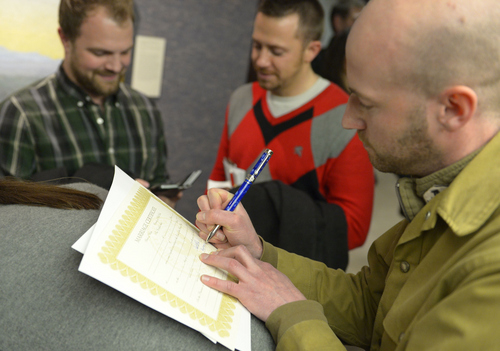This is an archived article that was published on sltrib.com in 2014, and information in the article may be outdated. It is provided only for personal research purposes and may not be reprinted.
In the wake of a U.S. Supreme Court decision halting same-sex marriages in Utah, many state and federal agencies are unsure about what to do with the more than 1,300 couples who wed during the 17 days such unions were legal.
"It's a mess right now. There are conflicting laws all over the country," said attorney Lori Nelson in an email. "It's made it difficult for employers, municipalities, etcetera. No one knows what to do."
Even though the U.S. military now provides benefits to same-sex spouses after the high court struck down part of the Defense of Marriage Act, authorities over Hill Air Force Base say its unclear whether they will do the same with Utah newlyweds.
"At this point, it is too early for us to tell whether any same-sex marriages in Utah prior to the Supreme Court's stay are legally valid," said spokesman Richard Essary in a statement.
The Internal Revenue Service has allowed same-sex couples legally married in their home states to file jointly since August, but the agency didn't provide an answer Tuesday on whether they would do the same for same-sex couples in the Beehive State.
The Utah State Tax Commission isn't sure either. The agency is scheduled to take up the issue at a Thursday meeting — though that could change, said spokesman Charlie Roberts. Before U.S. District Judge Robert Shelby struck down the state's ban Dec. 20, the state had said it would not follow the federal government's lead and accept joint filings from gay couples married outside Utah.
As tax time looms, movie set designer Mark Hofeling isn't sure whether he'll he able to file jointly with his partner of 16 years, graphic designer and DJ Jesse Walker.
"For us, marriage was less romantic and more about civil rights and economic security," said Hofeling, who wed hours after Shelby's ruling.
But he's not complaining. Hofeling is happy to deal with headaches like combined income and whether they can get insurance together.
"I don't think [straight people] realize all the benefits that are simply accorded to them the moment they go to Vegas and get married in a chapel," Hofeling said. "Those of us on the other side have to work like crazy to get legal protections for our relationship."
Newlywed couples who work for the state or 300 other public agencies in Utah can still sign up for benefits through the Public Employees Health Program, said legal counsel Dee Larsen. At least 30 couples have applied so far.
"Those that are legally married can apply for and qualify for the benefits,"said Larsen.
Two universities insured by PEHP, Weber State and Dixie State, have also extended benefits to legal same-sex spouses. (Salt Lake Community College and the University of Utah already offered benefits to domestic partners).
"We're following the law," said Dixie State spokesman Steve Johnson. "One employee on campus has already signed up."
Utah Valley University has done the same, though they have a different provider.
"We consider those who were legally married during the window as benefits-eligible," said UVU spokesman Chris Taylor. "Moving forward as the state and courts give additional direction, we'll respond accordingly."
A state appeal of Shelby's decision is now before the 10th Circuit Court of Appeals in Denver. It's unclear whether approximately 1,300 unions legalized will remain valid.
Adoption, meanwhile, appears to be another legal gray area. The state passed a law in 2000 banning adoption by gay couples, but the statute refers to "adults who are cohabiting in a relationship that is not a legally valid" — wording that could open a window for couples married after Shelby's ruling.
"The adoption statute doesn't speak in terms of gender. The small population of same-sex couples who were legally married could say, 'Look, we're legal spouses, we should be able to adopt,'" said Nelson, who has handled adoption cases. "The marriages are valid right now and were based on validly issued marriage licenses."
Twitter: @lwhiteheurst



